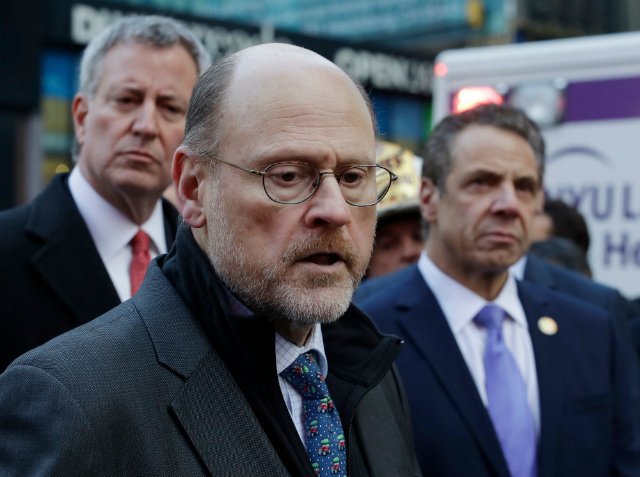Cuomo And His MTA Lied About The Real Reason For MTA Chair's Resignation
July 31, 2019, 3:52 p.m.
The Governor's Office and the MTA also declined to comment on why it misled the public.

MTA Chairman Joe Lhota, center, talks at a news conference with New York Mayor Bill de Blasio, left, and Governor Andrew Cuomo, outside the Port Authority Bus Terminal in New York.
When Joe Lhota resigned his post as MTA Chair way back in November of 2018, both Lhota and the man who appointed him, Governor Andrew Cuomo, made it seem as if this was a natural conclusion to a job well done. The press release announcing his departure made no mention of the serious ethics concerns raised by journalists and good government watchdogs about Lhota’s lucrative side gigs, and instead praised his work on the Subway Action Plan.
“The original understanding was he would just help out for a period and then do his substantial work that he's doing in the private sector,” Cuomo told billionaire Cuomo donor John Catsimatidis during an appearance on his radio show. “He fulfilled that commitment to me and he's going to resign as chair of the MTA.”
But on Tuesday, Politico obtained Lhota’s resignation letter to Cuomo, dated November 8, 2018, two days after Cuomo secured a third term. The letter cited a state ethics committee decision that his role as a board member at Madison Square Garden, and his day job as chief of staff at NYU Langone were “legally incompatible” with his role as MTA chairman, and that “recusal could not adequately cure or mitigate any potential conflicts...Accordingly I am stepping down as chairman immediately.”
Lhota added, “Congratulations on your reelection.”
Asked about why Cuomo did not tell New Yorkers the actual reason his MTA chair resigned, the governor’s office referred us to the MTA.
The MTA also declined to comment on why it misled the public. Instead, a spokesman cited Lhota’s decision to not take a paycheck as evidence that no harm was done, despite the Joint Commission on Public Ethics’s determination that Lhota’s pro bono work didn’t absolve him of potential conflicts of interest.
“During his time at the MTA, Chairman Lhota recused himself from every issue related to Madison Square Garden,” MTA spokesman Max Young, wrote.
At an MTA board meeting last March, Rachael Fauss, a leader of the good government group Reinvent Albany, suggested that the board look into Lhota’s potential conflicts of interest.
Top Cuomo aide and MTA board member Larry Schwartz called it “character assasination,” and excoriated Fauss for suggesting that Lhota had conflicts of interest.
Remember when Larry Schwartz screamed at @RachaelFauss for merely calling out the conflicts of interests at the MTA governance committee hearing. pic.twitter.com/r62KLhFf3F
— JarekFA (@JarekFA) July 30, 2019
On Wednesday, Schwartz continued to defend Lhota.
“It doesn’t matter anymore the reason he resigned,” Schwartz said Wednesday. “It’s not like he was there and he voted on something that came out he had a conflict of interest. He resigned when he realized these things were a conflict of interest and he couldn’t overcome it by recusing himself. He did the right things, kudos to Joe.”
Schwartz also declined to apologize to Fauss for publically browbeating her for even raising ethics issues, which turned out to be correct.
“All they [Reinvent Albany] do is throw hand grenades into the crowd. All they do is criticize everything. They’re not providing any useful information to board members or anyone else,” Schwartz said. “I’m interested in solutions and results I’m not interested in telling me what I already know.”
In fact, Fauss did come up with 50 suggestions for the MTA to improve its transparency. Fauss told Gothamist that if Lhota’s conflicts of interest had been made public in the first place and weren’t revealed later in SEC filings, perhaps he never would’ve been appointed chairman.
“The public needs to be assured that those who are representing them in government and working at the highest level of government, especially an agency, a $17 billion agency like the MTA, that they’re working solely for the public and not working for outside companies,” Fauss said.
Lhota didn’t reply to requests for comment.
Stephen Nessen is the transportation reporter for WNYC. You can follow him on Twitter @s_nessen.